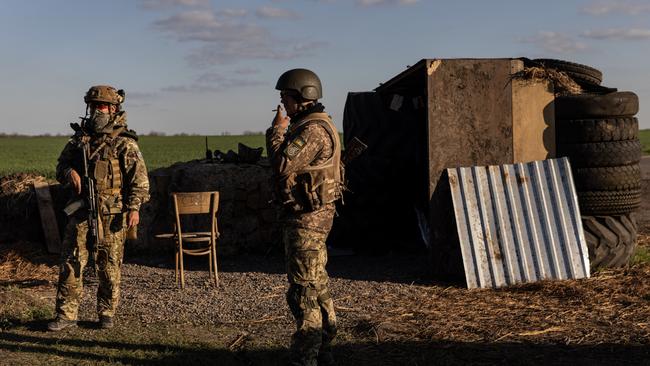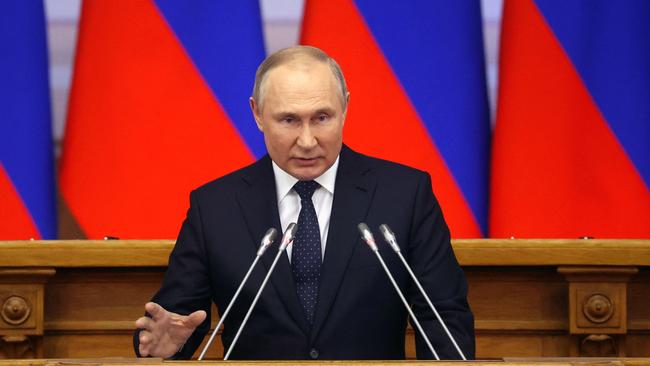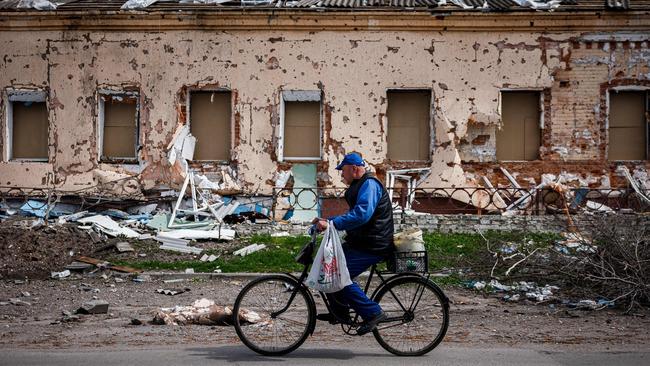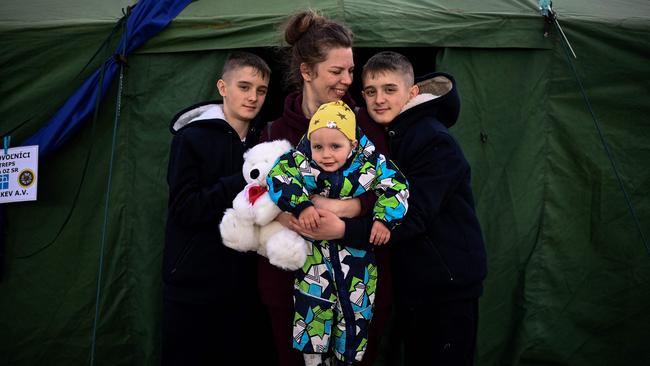EU defies Russia’s gas ‘blackmail’ as Putin cuts supply to Poland and Bulgaria
The EU has warned Russia it will not bend to ‘blackmail’ over its support for Kyiv after the Kremlin cut off gas supplies to Bulgaria and Poland.

The EU has warned Russia it will not bend to “blackmail” over its support for Kyiv after the Kremlin cut off gas supplies to Bulgaria and Poland.
The warning on Wednesday night came ahead of UN chief Antonio Guterres arriving in Kyiv to meet Ukrainian leader Volodymyr Zelensky following talks with Russian President Vladimir Putin in Moscow.
Mr Guterres visited sites of alleged Russian war crimes in Ukraine, decrying war as “an absurdity in the 21st century”.
Making his first visit to Ukraine since the invasion, Mr Guterres toured several towns and villages outside Kyiv.
Mr Putin also issued a warning on Wednesday, saying that if Western forces intervened in Ukraine, they would face a “lightning-fast” military response.
“We have all the tools for this, that no one else can boast of having,” the Russian leader told parliamentarians, implicitly referring to Moscow’s ballistic missiles and nuclear arsenal. “We won’t boast about it: we’ll use them, if needed. And I want everyone to know that. We have already taken all the decisions on this.”

The dire threats came as Moscow claimed to have carried out a missile strike in southern Ukraine to destroy a “large batch” of Western-supplied weapons.
Early on Thursday, the White House proposed to use assets seized from Russian oligarchs to compensate Ukraine for damage caused by Moscow’s invasion.
This would enable “transfer of the proceeds of forfeited kleptocratic property to Ukraine to remediate harms of Russian aggression”, the White House said in a statement.
The compensation idea is part of new proposed rules ratcheting up economic punishment on the Kremlin.
As the war, which has already claimed thousands of lives, entered its third month, Kyiv conceded that Russian forces had made gains in the east. Russia’s military offensive saw it capture a string of villages in the Donbas region, now the focus of its invasion.
And in its economic standoff with the West, Moscow cut off gas supplies to Bulgaria and Poland, two EU and NATO members backing Ukraine in the conflict.
However, European Commission president Ursula von der Leyen said Poland and Bulgaria were now receiving gas from their EU neighbours.
She described the announcement by Russia’s state energy giant Gazprom as “another provocation from the Kremlin”.
“It comes as no surprise that the Kremlin uses fossil fuels to try to blackmail us … Our response will be immediate, united and co-ordinated,” she said.
“The era of Russian fossil fuels in Europe will come to an end.”
EU officials said energy ministers from across the bloc would meet on Monday to discuss the situation.
European powers have imposed massive sanctions on Russia since Mr Putin’s decision to invade his neighbour, while shipping weapons to Ukraine’s defenders. But they have moved slowly on hitting Moscow’s vast exports, with many EU members – notably industrial giant Germany – reliant on Russian energy to keep their lights on.
Mr Putin has attempted to turn up the pressure by insisting that Russia will only accept payments for gas in roubles – hoping to force his foes to prop up his currency.
Gazprom announced the halt of gas to Poland and highly dependent Bulgaria, saying it had not received payment in roubles from the two EU members.

But Ms von der Leyen said that “about 97 per cent” of all EU contracts explicitly stipulate payments in euros or dollars – and warned importing firms off paying in roubles.
“This would be a breach of the sanctions,” she said. The European Commission, meanwhile, sought to lend Kyiv economic support by proposing a suspension of import duties on Ukrainian goods, though the idea still needs to be approved in a vote by the bloc’s 27 members.
President Volodymyr Zelensky welcomed the plan, saying Russia was “trying to provoke a global price crisis” and stir “chaos” in the world’s food market.
An IMF report issued on Wednesday said the war had “significantly” affected the Middle East and North Africa, with the crisis dealing a heavy blow to low-income countries dealing with surging inflation driven by rising food and fuel costs.
The first phase of Russia’s invasion failed to reach Kyiv or overthrow Mr Zelensky’s government after encountering stiff Ukrainian resistance reinforced with Western weapons.
The campaign has since refocused on seizing the east and south of the country while increasing the use of long-range missiles against west and central Ukraine. Ukrainian Defence Minister Oleksiy Reznikov predicted “extremely difficult weeks” for the country amid “destruction and painful casualties” during the offensive.
In Kharkiv, whose northern and eastern districts are less than 5km from the front, at least three people died and 15 were injured in shelling, Governor Oleg Synegoubov said on Wednesday.

Defenders of the besieged Azovstal factory in the strategic port city of Mariupol described massive bombardments, with Marine Sergey Volyna pleading for extraction for the 600 wounded soldiers and hundreds of civilians he said remain trapped there.
Russia’s defence ministry, meanwhile, said its forces had destroyed a “large batch” of weapons and ammunition supplied by the US and European countries.
Russia hit hangars at an aluminium plant near the Ukrainian city of Zaporizhzhia with “high-precision long-range sea-based Kalibr missiles”, the ministry said.
Local authorities denied that weapons had been stored at the factory, which they said had not been operational for six years.
Russia’s targeting of Western-supplied arms came as the US and Europe started to heed Mr Zelensky’s call for heavier firepower.
Western allies remain wary of being drawn into war with Russia but have stepped up military support as Ukraine has maintained its fierce resistance.
In a Wednesday night speech from London, UK Foreign Secretary Liz Truss made a fresh call for an increase in arms deliveries to Ukraine, including heavy weapons, tanks and planes.
AFP



To join the conversation, please log in. Don't have an account? Register
Join the conversation, you are commenting as Logout